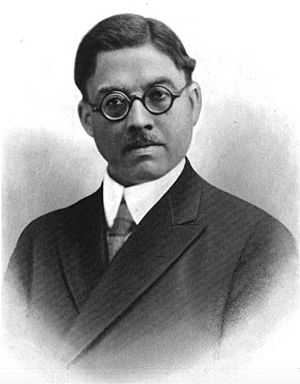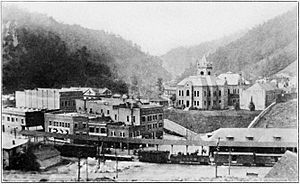Harry J. Capehart facts for kids
Quick facts for kids
Honorable
Harry J. Capehart
|
|
|---|---|

Portrait of Capehart, published in 1923
|
|
| Member of the West Virginia House of Delegates from McDowell County | |
| In office 1919–1925 Serving with
Luther C. Anderson (1919–1921) Clarence C. Hale (1919–1921) William J. McClaren (1919–1921) E. W. Cullen (1921–1923) J. A. Strother (1921–1925) H. L. Tutwiler (1921–1923) W. E. Eubank (1923–1925) McGinnis Hatfield (1923–1925) |
|
| Preceded by | Harvey Hagerman E. Howard Harper J. Buell Swope Robert F. Waldron |
| Succeeded by | Brooks F. Beavers E. W. Cullen E. Howard Harper Simon Solins |
| Member of the Howard University Board of Trustees |
|
| In office 1943–1952 |
|
| Personal details | |
| Born | May 2, 1881 Charleston, West Virginia, U.S. |
| Died | May 15, 1955 (aged 74) Bluefield, West Virginia, U.S. |
| Resting place | Oak Grove Cemetery, Bluewell, West Virginia, U.S. |
| Political party | Republican |
| Spouse | Anna Livingstone Hurley Capehart |
| Children | Harry Jheopart Capehart Jr. Arthur Froe Capehart |
| Parents | Joseph Capehart (father) Maggie Woodyard Capehart (mother) |
| Alma mater | Fairview Normal College Howard University School of Law |
| Profession | Lawyer, politician, and businessperson |
| Signature | |
Harry Jheopart Capehart Sr. (May 2, 1881 – May 15, 1955) was an important American lawyer, politician, and business leader in West Virginia. He was a member of the West Virginia House of Delegates, representing McDowell County for three terms from 1919 to 1925. He also worked as a city assessor (someone who values property for taxes), a city council member, and a city attorney for Keystone, West Virginia.
Capehart was born in 1881 in Charleston, West Virginia. He went to public schools in Charleston and then to Fairview Normal College. He earned his law degree with high honors from Howard University School of Law in 1913. Just one week after graduating, he was allowed to practice law in West Virginia. He opened his own law office in Keystone that same year.
He was very active in the West Virginia Republican Party and became a key leader in McDowell County. After serving in local city roles, he was elected to the state legislature. As a state representative, Capehart helped pass important laws. In 1919, he helped create a state school for African-American deaf and blind students. In 1921, he introduced a law against lynchings (mob killings), which became known as the Capehart Anti-Lynch Law.
After his time in the state legislature, Capehart continued to serve the public. He was appointed as an Assistant U.S. Attorney in 1932. He also helped farmers during the Great Depression. He remained active in the Republican Party at all levels. He died in 1955 in Bluefield, West Virginia.
Contents
Early Life and Education
Harry Jheopart Capehart was born in Charleston, West Virginia, on May 2, 1881. His father, Joseph Capehart, was a merchant, and his mother was Maggie Woodyard Capehart. Harry's grandparents on his mother's side were once enslaved in North Carolina. They gained their freedom before the Emancipation Proclamation and received farmland in what is now Logan County, West Virginia. There, they worked in farming and logging.
Capehart went to public schools in Charleston. He then graduated from Fairview Normal College in Proctorville, Ohio, in 1901. He had to pause his education to earn money to help his widowed mother raise his four younger brothers and sisters. Before going to law school, he worked as a tailor, a merchant, and a schoolteacher. He later attended Howard University School of Law, where he earned his law degree in 1913, graduating with the highest honors.
Law and Business Careers

Just one week after graduating from Howard University, Capehart was allowed to practice law in West Virginia. He argued his first case before the State Supreme Court in 1914. In 1913, Capehart opened a successful law office in Keystone. By 1920, he was one of only 23 African-American lawyers in West Virginia.
In the 1920s, he moved his practice from Keystone to Welch, West Virginia. In Welch, he started a law firm called Froe and Capehart with Arthur G. Froe. Later, another lawyer, Leon P. Miller, joined them, and the firm became Froe, Capehart, and Miller. By 1937, Capehart was the main partner. His son, Harry J. Capehart Jr., later joined the firm, and it became Capehart, Miller, and Capehart. Throughout his career, many people, both African-American and white, wanted his legal help.
After five years of practicing law, Capehart also became involved in the real estate business in 1918. By 1923, he had a successful real estate company with offices in Welch and Bluefield, West Virginia.
Political Career
Local Government Roles
Capehart was very active in the West Virginia Republican Party and became a leader in McDowell County. He was known as a strong and clear speaker, which helped him in politics. He started his political career by being elected as the city assessor for Keystone, serving two terms. In 1917, he was elected to Keystone's City Council. After being elected to the state legislature in 1918, he resigned from the City Council. However, he later returned to local government as Keystone's city attorney in 1921.
West Virginia House of Delegates
In August 1918, Capehart was one of three African-American men nominated by the Republican Party to run for seats in the West Virginia House of Delegates. This was the largest number of African-American candidates to run for the state house at that time. Capehart ran for one of four seats representing McDowell County. He won his election on November 6, becoming one of the four representatives for McDowell County.
Capehart served his first term in the Thirty-Fourth West Virginia Legislature from January 1919 to March 1920. He was reelected in 1920 for his second term, serving in the Thirty-Fifth West Virginia Legislature from 1921 to 1923. He was elected for his third and final term in 1922, serving in the Thirty-Sixth West Virginia Legislature from 1923 to 1925.
Important Laws He Helped Pass
During his three terms, Capehart was part of several important committees, including Education and Taxation. He helped pass several significant laws.
In 1919, Capehart introduced and supported House Bill 15. This bill created a state institution for African-American deaf and blind students in West Virginia. This led to the establishment of the West Virginia Schools for the Colored Deaf and Blind.
In 1921, Capehart introduced and supported House Bill 270. This bill set penalties for lynchings (mob killings). He worked hard to get the bill passed. The law stated that lynching by mobs was murder. It also said that counties where such crimes happened would have to pay $5,000 to the family of the person killed. This law became known as the Capehart Anti-Lynch Law. It was seen as a very important step in the fight against lynching. Capehart also helped pass a law that prevented showing images that made fun of or humiliated a specific race.
Working for the U.S. Government
In August 1932, Capehart was appointed as an Assistant United States Attorney for the Southern District of West Virginia. He was the first African-American to hold this position in West Virginia. In September 1934, he was appointed to help farmers with their property during the Great Depression. He would appraise their properties for the Farm Credit Administration.
Later Political Activities
Capehart continued to be very active in the Republican Party at the national, state, and local levels. In 1939, he was a main speaker at the West Virginia Republican Party's meeting in Charleston. He also directed the "Colored Division" of the West Virginia Republican Party Headquarters.
In 1940, Capehart organized a meeting in Charleston where African-American Republican leaders asked the party to appoint more African-Americans to important positions. He also served as a leader for the Eastern Colored Division Planning Board of the Republican National Committee (RNC) for the Wendell Willkie presidential campaign in 1940.
Personal Life
Family Life
Capehart married Anna Livingstone Hurley on November 28, 1917. Anna was a teacher from Washington, D.C.. They had two sons:
- Harry Jheopart Capehart Jr.
- Arthur Froe Capehart
Groups He Belonged To
Capehart was a member of the Baptist church. He also belonged to several fraternal organizations, like the Odd Fellows. He was a member of the Negro Bar Association of West Virginia, which was a group for African-American lawyers. In 1937, he became vice president of this association. He was also a member of the National Bar Association (NBA) and was appointed as its regional director for Virginia and West Virginia in 1937. Capehart was an active member of the National Association for the Advancement of Colored People (NAACP), a civil rights organization.
Other Interests
Capehart enjoyed reading the Bible and works by famous writers like William Blackstone, Ralph Waldo Emerson, and Leo Tolstoy.
Later Life and Death
In July 1942, Capehart spoke at the dedication of the West Virginia State Negro 4-H Camp. In 1943, he was elected to the Board of Trustees for Howard University, and he served there until 1952.
Capehart continued to practice law almost until he died. He passed away on May 15, 1955, at St. Mary's Hospital in Bluefield after a short illness. He was 74 years old. He was buried at Oak Grove Cemetery in Bluewell, West Virginia.
Legacy
In a 1923 book called History of the American Negro, Harry J. Capehart was described as a "successful lawyer and business man." He was praised for being one of the main leaders in West Virginia who helped create "constructive and progressive legislation relating to racial matters." The book also noted that Capehart believed that progress for African-Americans depended on education and more involvement in business.
In February 2005, the West Virginia Human Rights Commission honored Capehart after his death for his important contributions.

